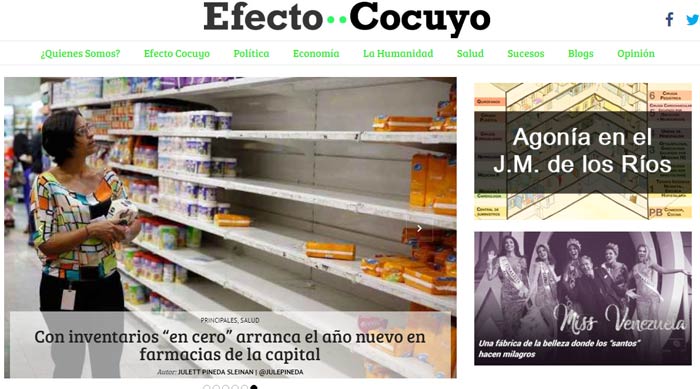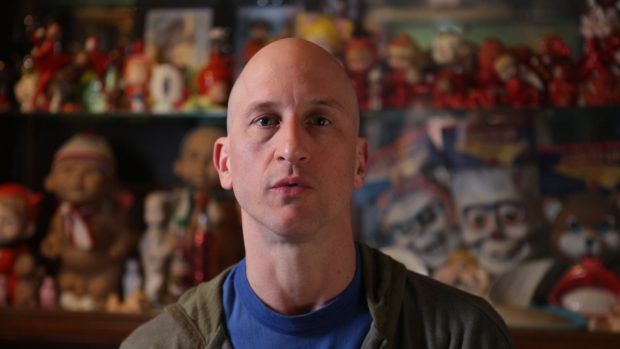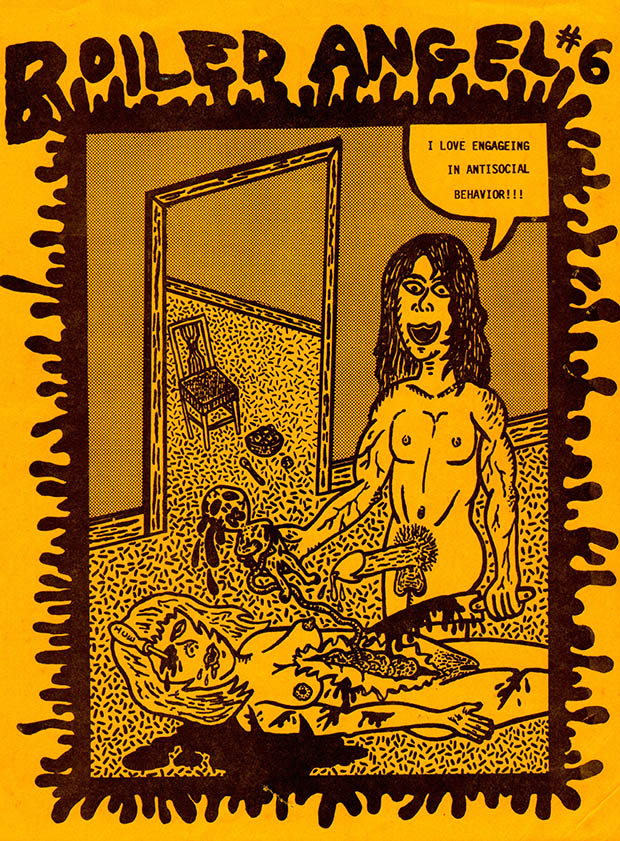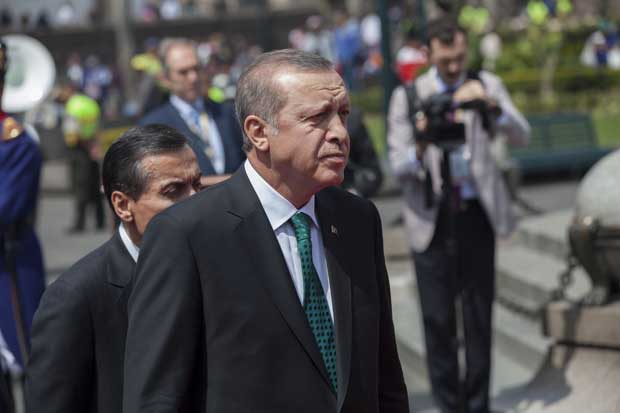8 Jan 2018 | Argentina, Brazil, Colombia, Ecuador, Honduras, Mexico, News, Venezuela
[vc_row][vc_column][vc_column_text]

Latin America is home to a growing number of independent publications, like Venezuela’s Efecto Cocuyo, that do not depend on government advertising
With general elections scheduled in six Latin American countries this year, and another six to follow in 2019, the relationship between the media and democracy could have a major impact on the future of the region. However, mounting financial pressures are robbing many media outlets of their objectivity and forcing them to toe pro-government lines.
With traditional advertising revenue in decline, Latin American governments are using vast publicity budgets to keep cash-strapped publications afloat. In return, the media are expected to portray their benefactors in a favourable light.
According to the NGO Freedom House, much of the media in Brazil, Colombia, Ecuador, Honduras and Mexico is heavily dependent on government advertising, resulting in widespread self-censorship and collusion between public officials, media owners and journalists.
“The history of journalism in Latin America is a history of collusion between the press and powerful people,” said Rosental Alves, a Brazilian journalist and founder of the Knight Center for Journalism in the Americas, in an interview with Index. Sections of the media have become subservient, he explained, as any critical coverage could be punished with audits or a loss of advertising revenue.
Financial pressures on the media are particularly pronounced in Venezuela. Alves observed that the Nicolás Maduro regime has applied “waves of censorship” to the media by first decrying it as “the enemy of the people” and then buying up media companies to “make them friendly.”
Freedom House notes that “although privately owned newspapers and broadcasters operate alongside state outlets, the overall balance has shifted considerably toward government-aligned voices in recent years. The government officially controls 13 television networks, dozens of radio outlets, a news agency, eight newspapers, and a magazine.”
This is compounded by Venezuela’s severe economic problems and the virtual government monopoly on newsprint supplies that have led to newspaper closures, staff cutbacks and reduced circulation of critical media.
Mexico’s government has taken the more subtle approach of co-opting swathes of the media through unprecedented expenditure on advertising. According to the transparency group Fundar, President Enrique Peña Nieto has spent almost £1.5 billion on advertising in the past five years, more than any president in Mexican history. On top of that, state and municipal administrations have also spent millions on publicity in local media.
Darwin Franco, a freelance journalist in Guadalajara, told Index that government spending has led to some publications telling reporters “who they can and cannot criticise in their work.”
Then there is the infamous chayote, a local term for bribes paid to journalists in return for favourable coverage. Franco said Mexican reporters are particularly vulnerable to economic pressures or under-the-table incentives because it’s so hard for them to make a living.
“Freelance journalists in Mexico don’t receive the benefits that employees are legally entitled to,” he said. “National media outlets — and even some international ones — pay us minimal fees for stories, which in some cases don’t even cover the costs of reporting.”
Franco, who also teaches journalism at a local university, added that many reporters take on second jobs to supplement their income. With Mexican journalists making less than £450 per month on average, he acknowledged that “there may be people who are tempted” to take money from the government.
Despite these financial pressures, Alves is encouraged by the technology-driven democratisation of the media across Latin America, with increased internet penetration and the affordability of smartphones allowing people who could not afford computers to access nontraditional media for the first time.
These include rudimentary blogs, social media accounts and more sophisticated media startups, Alves said, with countries like Argentina, Brazil, Colombia, Mexico and even Venezuela home to a growing number of independent publications that do not depend on government advertising.
“We are living a time of the decline of advertisements as the main source of revenue for news organisations. On the one hand you have this huge decline in traditional advertising because of Google and Facebook getting all this money, and on the other hand you see the virtual disappearance of the entry barriers for becoming a media outlet,” Alves noted.
“We’re moving from the mass media to a mass of media because there’s this proliferation of media outlets that don’t depend on a lot of money,” he added. “If you can gather some philanthropic support or membership, or you’re just doing it by yourself, like many courageous bloggers are doing in many parts of the region, you don’t make any money but you don’t spend any money either.”[/vc_column_text][/vc_column][/vc_row][vc_row][vc_column][vc_custom_heading text=”Survey: How free is our press?” use_theme_fonts=”yes” link=”url:https%3A%2F%2Fwww.indexoncensorship.org%2F2017%2F12%2Fsurvey-free-press%2F|title:Take%20our%20survey||”][vc_separator color=”black”][vc_row_inner][vc_column_inner width=”1/4″][vc_icon icon_fontawesome=”fa fa-pencil-square-o” color=”black” background_style=”rounded” size=”xl” align=”right”][/vc_column_inner][vc_column_inner width=”3/4″][vc_column_text]
This survey aims to take a snapshot of how financial pressures are affecting news reporting. The openMedia project will use this information to analyse how money shapes what gets reported – and what doesn’t – and to advocate for better protections and freedoms for journalists who have important stories to tell.
More information[/vc_column_text][/vc_column_inner][/vc_row_inner][vc_separator color=”black”][vc_row_inner][vc_column_inner width=”1/2″][vc_single_image image=”97191″ img_size=”full” alignment=”center” onclick=”custom_link” link=”https://www.indexoncensorship.org/2018/01/tracey-bagshaw-compromise-compromising-news/”][/vc_column_inner][vc_column_inner width=”1/2″][vc_column_text]
Commercial interference pressures on the UK’s regional papers are growing. Some worry that jeopardises their independence.[/vc_column_text][/vc_column_inner][/vc_row_inner][vc_separator color=”black”][vc_row_inner][vc_column_inner width=”1/2″][vc_single_image image=”81193″ img_size=”full” alignment=”center” onclick=”custom_link” link=”https://www.indexoncensorship.org/2017/12/jean-paul-marthoz-commercial-interference-european-media/”][/vc_column_inner][vc_column_inner width=”1/2″][vc_column_text]
Commercial pressures on the media? Anti-establishment critics have a ready-made answer: of course, journalists are hostage to the whims of corporate owners, advertisers and sponsors. Of course, they cannot independently cover issues which these powers consider “inconvenient”.[/vc_column_text][/vc_column_inner][/vc_row_inner][vc_separator color=”black”][vc_row_inner][vc_column_inner width=”1/2″][vc_single_image image=”96949″ img_size=”full” alignment=”center” onclick=”custom_link” link=”https://www.opendemocracy.net/openmedia/mary-fitzgerald/welcome-to-openmedia”][/vc_column_inner][vc_column_inner width=”1/2″][vc_column_text]
Forget fake news. Money can distort media far more disturbingly – through advertorials, and through buying silence. Here’s what we’re going to do about it.
This article is also available in Dutch | French | German | Hungarian | Italian |
Serbian | Spanish| Russian[/vc_column_text][/vc_column_inner][/vc_row_inner][vc_separator color=”black”][/vc_column][/vc_row][vc_row][vc_column][vc_custom_heading text=”Don’t lose your voice. Stay informed.” use_theme_fonts=”yes”][vc_separator color=”black”][vc_row_inner][vc_column_inner width=”1/2″][vc_column_text]Index on Censorship is a nonprofit that campaigns for and defends free expression worldwide. We publish work by censored writers and artists, promote debate, and monitor threats to free speech. We believe that everyone should be free to express themselves without fear of harm or persecution – no matter what their views.
Join our mailing list (or follow us on Twitter or Facebook) and we’ll send you our weekly newsletter about our activities defending free speech. We won’t share your personal information with anyone outside Index.[/vc_column_text][/vc_column_inner][vc_column_inner width=”1/2″][gravityform id=”20″ title=”false” description=”false” ajax=”false”][/vc_column_inner][/vc_row_inner][vc_separator color=”black”][/vc_column][/vc_row][vc_row][vc_column][vc_basic_grid post_type=”post” max_items=”12″ style=”load-more” items_per_page=”4″ element_width=”6″ grid_id=”vc_gid:1515148254502-253f3767-99a5-8″ taxonomies=”8996″][/vc_column][/vc_row]
16 Dec 2016 | Magazine, Magazine Contents, Volume 45.04 Winter 2016
[vc_row][vc_column][vc_custom_heading text=”Contributors include Lily Cole, Daphne Selfe, Linda Grant, Bibi Russell, Katy Werlin, Jang Jin-sung, Maggie Alderson and Eliza Vitri Handayani”][vc_row_inner][vc_column_inner width=”1/2″][vc_column_text]
The latest issue of Index on Censorship magazine looks at fashion and how people both express freedom through what they wear. But it also looks at how women in particular have their freedom of expression curtailed by rigid dress codes – whether they are women in Saudi Arabia who have to wear abayas by law or women in the UK and Canada whose employers insist they wear high heels shoes.
[/vc_column_text][/vc_column_inner][vc_column_inner width=”1/2″][vc_single_image image=”82377″ img_size=”full”][/vc_column_inner][/vc_row_inner][vc_column_text]
Models Lily Cole and Daphne Selfe discuss why changes in society are reflected in the clothes we (are allowed) to wear. Maggie Alderson, former editor of Elle describes how she was arrested for being a punk rocker in the 1970s, while Eliza Vitri Handayani talks about how punks in Indonesia today are still persecuted for what they wear and how they look. Nigerian model and journalist Wana Udobang riffs on fashion in Nigeria and how she was snubbed by bouncers and waiters at a wedding for wearing the wrong clothes.
Ismail Einashe describes how traditional dress can be life-threatening for Oromos in Ethiopa, while Magela Baudoin delves into class and ethnic gradations in Bolivia and reveals that the way some women dress means they are discriminated against. Novelist Linda Grant describes how her Jewish immigrant parents used the way they dressed to try and fit into middle-class British society. Meanwhile Katy Werlin gives a historical perspective as she discusses how the 18th century French revolutionaries, known as sans-culottes, celebrated their peasant clothes as they overthrew the aristocratic regime.
Martin Rowson brings another perspective to fashion in his new cartoon which depicts a catwalk on which despots show off their latest costumes. Spot President-elect Donald Trump sporting a furry thong. Trump is also in US media expert Eric Alterman’s sights as he describes why journalists in the USA believe the new president will seek to challenge media freedoms guaranteed by the constitution. Turkish researchers Burak Bilgehan Özpek and Başak Yavcan investigate how the Turkish government is using state advertising to control the media.
We also publish an interview with Turkish intellectual, linguist and founder of a mathematics village Sevan Nişanyan. Our reporter communicated with him using notes smuggled out from the prison where he is serving a 16-year sentence on charges connected with freedom of speech. The culture section includes poems from a former North Korean propagandist Jang Jin-sung who defected to the South and now runs a website smuggling news out of North Korea. We also carry poems about the extraordinariness of everyday life from Brazilian author Paulo Scott and a never before seen English translation of a short story by legendary Argentine writer Haroldo Conti.
[/vc_column_text][/vc_column][/vc_row][vc_row][vc_column][vc_custom_heading text=”SPECIAL REPORT: FASHION RULES” css=”.vc_custom_1481731933773{margin-right: 0px !important;margin-left: 0px !important;border-bottom-width: 1px !important;padding-top: 15px !important;padding-bottom: 15px !important;border-bottom-color: #455560 !important;border-bottom-style: solid !important;}”][vc_column_text]
Dressing to oppress: why dress codes and freedom clash
The censors’ new clothes, by Rachael Jolley: Freedom is not about the amount of clothing you put on or take off, but about having the choice to do so
Fashion police, by Natasha Joseph: Some feel the miniskirt is a threat to the state in Uganda and women are getting attacked for wearing it
Wearing a T-shirt got me arrested, by
Maggie Alderson: Wearing punk clothes in 1970s London was dangerous, but now British teenagers can wear anything
Colour bars, by Magela Baudoin: Traditional clothing is still a sign of social status in Bolivia and wearing such clothes often leads to discrimination
Models of freedom, by Bibi Russell: Bangladeshi women are now vital to the economy but they are still restricted in their dress
The big cover-up, by Laura Silvia Battaglia: Women in Saudi Arabia and Yemen test how far they can customise what they are allowed to wear. Translation by Lucinda Byatt
Rebel with a totally fashionable cause, by Wana Udobang: A Nigerian model refuses to conform to stifling social expectations and sees the consequences
Stripsearch cartoon, by Martin Rowson: A fetching new range of despotwear
Ethiopia in crisis, closes down news, by Ismail Einashe The Oromo people use traditional clothing as a symbol of resistance and it is costing them their lives
Baggy trousers are revolting
, by Katy Werlin: The sans-culottes of the French revolution transformed peasant dress into a badge of honour
Muslim punks in mohawks attacked, by Eliza Vitri Handayani: Punks in Indonesia are persecuted but still manage to maintain a culture which stands up for difference
Design is the limit, by Jemimah Steinfeld: China is loosening up on personal freedoms including fashion, but designers still face some constraints
A modest proposal, by Kaya Genç: “Modest” dress codes are all the rage in Turkey as some turn their backs on the legacy of Atatürk
Uniformity rules, by Jan Fox: Prisoners often try to customise their uniforms but does stripping individuality make rehabilitation more difficult?
Keeping up appearances, by Linda Grant: Linda Grant’s immigrant family were upwardly mobile and bought clothes that showed their aspirations
Sewing it up, by Rachael Jolley: At 88 Daphne Selfe is Britain’s oldest supermodel. She talks about how fashion has changed in her lifetime
Style counsels, by Kieran Etoria-King: Model, activist and actor Lily Cole talks about how school girls customise their uniforms to give them a sense of individuality
Tall stories, by Sally Gimson: Wearing high heels is a way for some women to express freedom, while for others it’s a form of oppression
[/vc_column_text][/vc_column][/vc_row][vc_row][vc_column][vc_custom_heading text=”IN FOCUS” css=”.vc_custom_1481731813613{margin-right: 0px !important;margin-left: 0px !important;border-bottom-width: 1px !important;padding-top: 15px !important;padding-bottom: 15px !important;border-bottom-color: #455560 !important;border-bottom-style: solid !important;}”][vc_column_text]
Challenging media, by Eric Alterman: If his campaign is anything to go by, President Trump is likely to restrict freedom of the press
Living in limbo, by Marco Salustro: A journalist reveals the challenges of reporting from inhumane migrant detention camps in Libya
Follow the money, by
Burak Bilgehan Özpek and Başak Yavcan: The Turkish government is rewarding newspapers which favour its position with more state-sponsored advertising
Fighting for our festival
freedoms, by Peter Florence: Mutilated bodies, petitions and a citizen’s arrest: the director of the Hay literary festivals describes the trials and tribulations of his job
Barring the bard, by Jennifer Leong: Actor Jennifer Leong on confronting attempts to censor performances of Shakespeare around the world
Assessing Correa’s free
speech heritage, by Irene Caselli: The Ecuadorian president’s record on free speech is reviewed as his term in office comes to an end. He gave sanctuary to Wikileaks founder, Julian Assange, in the country’s London embassy but brought in restrictive media laws at home
Framed as spies, by Steven Borowiec: South Korean journalist Choi Seung-ho hit a national nerve when he exposed the security services for framing ordinary citizens as North Korean spies
[/vc_column_text][/vc_column][/vc_row][vc_row][vc_column][vc_custom_heading text=”CULTURE” css=”.vc_custom_1481731777861{margin-right: 0px !important;margin-left: 0px !important;border-bottom-width: 1px !important;padding-top: 15px !important;padding-bottom: 15px !important;border-bottom-color: #455560 !important;border-bottom-style: solid !important;}”][vc_column_text]
Back from the Amazon, by
Paulo Scott: Newly translated poems from Scott’s acclaimed collection, Even Without Money I Bought a New Skateboard. Interview by Kieran Etoria-King. Poems translated by Stefan Tobler
A story from the disappeared, by Haroldo Conti: Jon Lindsay Miles introduces a poignant short story, published in English for the first time, by the award- winning Argentine writer who disappeared in 1976. Translation also by Jon Lindsay Miles
Poems for Kim, by Jang Jin-sung: North Korean propagandist poet turned high profile defector talks about life within the world’s most secretive country. Interview by Sybil Jones
[/vc_column_text][/vc_column][/vc_row][vc_row][vc_column][vc_custom_heading text=”COLUMNS” css=”.vc_custom_1481732124093{margin-right: 0px !important;margin-left: 0px !important;border-bottom-width: 1px !important;padding-top: 15px !important;padding-bottom: 15px !important;border-bottom-color: #455560 !important;border-bottom-style: solid !important;}”][vc_column_text]
Global view, by Jodie Ginsberg: Face-to-face encounters are still important and governments worldwide know that restricting travel continues to be an effective way of stifling voices
Index around the world, by
Kieran Etoria-King: Coverage of Index’s work over the last few months including exposing the difficulties of war reporting and our Mapping Media Freedom project
[/vc_column_text][/vc_column][/vc_row][vc_row][vc_column][vc_custom_heading text=”END NOTE” css=”.vc_custom_1481880278935{margin-right: 0px !important;margin-left: 0px !important;border-bottom-width: 1px !important;padding-top: 15px !important;padding-bottom: 15px !important;border-bottom-color: #455560 !important;border-bottom-style: solid !important;}”][vc_column_text]
Where’s our president? by
Kiri Kankhwende: Malawi’s journalists tease their president as part of a campaign to make the government more transparent
[/vc_column_text][/vc_column][/vc_row][vc_row][vc_column][vc_custom_heading text=”SUBSCRIBE” css=”.vc_custom_1481736449684{margin-right: 0px !important;margin-left: 0px !important;border-bottom-width: 1px !important;padding-bottom: 15px !important;border-bottom-color: #455560 !important;border-bottom-style: solid !important;}”][vc_column_text]Index on Censorship magazine was started in 1972 and remains the only global magazine dedicated to free expression. Past contributors include Samuel Beckett, Gabriel García Marquéz, Nadine Gordimer, Arthur Miller, Salman Rushdie, Margaret Atwood, and many more.[/vc_column_text][vc_row_inner][vc_column_inner width=”1/2″][vc_single_image image=”76572″ img_size=”full”][/vc_column_inner][vc_column_inner width=”1/2″][vc_column_text]In print or online. Order a print edition here or take out a digital subscription via Exact Editions.
Copies are also available at the BFI, the Serpentine Gallery, MagCulture, (London), News from Nowhere (Liverpool), Home (Manchester), Calton Books (Glasgow) and on Amazon. Each magazine sale helps Index on Censorship continue its fight for free expression worldwide.
 SUBSCRIBE NOW[/vc_column_text][/vc_column_inner][/vc_row_inner][/vc_column][/vc_row]
SUBSCRIBE NOW[/vc_column_text][/vc_column_inner][/vc_row_inner][/vc_column][/vc_row]
21 Oct 2016 | Americas, mobile, News, United States

For the good of society, American cartoonist Mike Diana was jailed without bail in 1994. So ruled a jury at the Pinellas County court in Florida, taking just 90 minutes to find him guilty of obscenity following a week-long trial in March of that year.
Diana was the first – and to date, only – cartoonist to be jailed for his work in the USA.
His ordeal began when one of his Boiled Angel comics – with the stated aim of being “the most offensive zine ever made” – ended up in the hands of a law enforcement officer in California in 1991. The shocking (and often funny) depictions of sex and violence reminded him of a series of then-unsolved murders in Gainesville, Florida. He passed his suspicions on to counterparts in the Sunshine State who took a blood sample from Diana. The cartoonist was found to have had absolutely no links with the crime but prosecutor Stuart Baggish took one look at the comic “and knew right away what [he] was looking at was obscenity”.
Boiled sold only 300 copies by mail and the only issue sold in Dian’s hometown was to an undercover police officer. Although quickly released, Diana was given three years probation, ordered to pat a $3,000 fine, given 1,248 hours community service and ordered to avoid contact with minors.

A new documentary is in the works about Diana and the limitations of the right to free speech in the face of outrage and cries of obscenity. The Trial of Mike Diana, created by cult filmmaker Frank Henenlotter, has launched a Kickstarter campaign to raise funds to finish the film and to cover the costs of a legal review typical of a project which deals heavily with the American court system.
The documentary features many of those who were there during the 1994 trial, including Baggish, as well as interviews with Diana fans and supporters Neil Gaiman, Peter Bagge and Stephen Bissette.
Diana will contribute original animation to the film.
For a medium that lends itself so well to the light-hearted, cartoons have frequently fallen victim to censors. More than two decades on from the sentencing of Diana, they still face prosecution, persecution, death threats and abuse worldwide. Last year’s attack on the offices of Charlie Hebdo was the most high-profile example of just how dangerous the medium can be.
Could history be repeated in the USA? Are the freedoms many Americans take for granted at risk? As Henenlotter puts it: “Freedom of Speech doesn’t mean anything if your art is declared ‘obscene’ and one man’s art could be another man’s obscenity. That’s the battle we explore in this documentary: an improbable collision between comic-book art and the First Amendment.”
More articles about cartoonists:
Targeted cartoonists show support for Charlie Hebdo
Malaysian cartoonist Zunar says “I will keep drawing until the last drop of my ink”
Ecuadorean cartoonist Bonil facing charges after mocking politician
Indian cartoonist arrested on sedition charges
21 Jul 2016 | Europe and Central Asia, Mapping Media Freedom, mobile, News, Turkey, Turkey Uncensored
The failed 15 July coup, bloody and despicable, delivered a lethal blow to the already crippled democratic order in Turkey. The cabal behind the putsch has become a midwife to Turkey’s “autogolpe” or self-coup. With every step, President Reccep Tayyip Erdogan and his Justice and Development Party (AKP) backers have introduced further restrictive sanctions.
This creeping self-coup is a prospect I raised in early 2014 with a long analysis for the German edition of Le Monde Diplomatique entitled Putsch im Zeitlupe. In that article I pointed out the parallels between the career of Alberto Fujimori, the former Peruvian president who is in prison for his corruption, and the increasingly autocratic methods employed by Erdogan.
The reaction to the totally unacceptable coup so far sadly has endorsed my theory. The reformatting of the Turkish state is now in fast-forward mode with a massive purge underway.
Tension has spilled over into academia. The head of the Supreme Board of High Education (YÖK), which itself is the product of the 1980 military coup d’état, called all the presidents of universities to an emergency meeting. It was followed by two drastic steps: YÖK issued a directive demanding the resignations of 1,577 deans across the country and, on Wednesday morning, blocked travel for all academics who were travelling abroad. YÖK also ordered all Turkish academics resident in universities in other countries to return home.
The media has been strangled even further. Within the past 48 hours, around 20 news sites were blocked by the Telecommunications Authority (TIB). On Tuesday night, the High Board of Radio and TV (RTUK) cancelled the licences of 24 TV and radio channels. The office of the press directorate announced that the press cards of 34 editors and reporters were cancelled. Officials cited “linkage with FETO structures” when explaining the bans. According to Turkish authorities, FETO is the terrorist organisation headed by the US-based cleric Fetullah Gulen, who has created a parallel state and is behind the failed coup.
The daily Özgür Düşünce, now accused of being an extension of “FETO terror organisation”, announced on Wednesday it was shutting down. The irony is that the daily that had assembled the finest core of liberal columnists who for many years struggled for a democratic order.
Also on Wednesday the editor of Meydan daily Levent Kenez and managing editor Gülizar Baki were arrested during a police raid without any explanation. Both are first class journalists.
Another drama has been developing around Wikileaks, which has published nearly 300,000 emails along with thousands of attached files from 762 mailboxes that allegedly belong to email domain of the AKP. The e-mails span between 2010 and June 2016.
Wikileaks was banned after some hours. “Turks will likely be censored to prevent them reading our pending release of 100k+ docs on politics leading up to the coup,” an earlier statement by Wikileaks read. It was later reported that ”WikiLeaks’ infrastrucutre was under sustained attack” following its announcement.
Concerns are at the alert level internationally. The International Federations of Journalists and the European Federations of Journalists contacted the Council of Europe about a series of new press freedom violations. Mapping Media Freedom has logged 18 violations of press freedom aimed at news outlets or professionals since the night of the coup attempt.
All journalists affiliated with the independent outlets know they have to work on the realistic presumption that conditions will worsen for them. If the Erdogan-led government has decided to deepen the path towards a self-coup and to utilise the extraordinary circumstances to ruthlessly settle scores with all dissent and opposition, the presumption is legitimate. All segments of civil society may soon be unable to avoid feeling they have been “taken hostage” as a result of the coup attempt that has pushed Turkey back decades.
A version of this article was originally posted to Suddeutsche Zeitung. It is published here with permission of the author.

Turkey Uncensored is an Index on Censorship project to publish a series of articles from censored Turkish writers, artists and translators.





